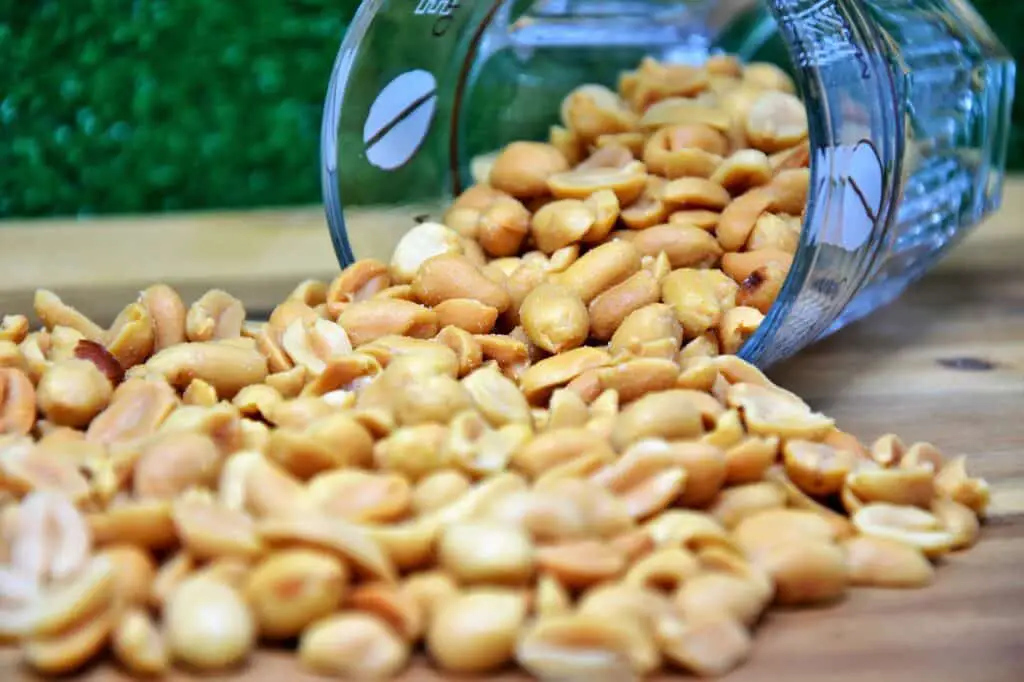Don’t we all love the versatility of roasted peanuts?
If you’re on a weight-loss journey, roasted peanuts can be an excellent snack as it’s loaded with proteins, helping you stay full without worrying about calories.
While we may enjoy these healthy treats, we can’t help but wonder if the same goes for our pups.
Well, let’s find out.
Are roasted peanuts good for dogs?
Yes.
Roasted peanuts are good for dogs to eat in moderation as they’re chock-full of valuable minerals and vitamins like Vitamin E and proteins.
However, you should only feed your dog roasted peanuts that are unsalted, unflavored, and without added oils.
This article will discuss everything roasted peanuts and dogs.
It will also explain the potential health risks of feeding your dog roasted peanuts.

Can my dog eat roasted peanuts?
Yes.
You can safely feed your dog a small amount of dry roasted peanuts as too much oil can cause severe health issues for your dog.
If your dog consumes roasted peanuts that involve frying, he may experience vomiting or diarrhea, leading to rapid weight gain.
It may also increase the chances of obesity, heart disease, and gastrointestinal issues.
You should also consider offering your dog plain peanuts as some commercially available roasted peanuts may contain toxic flavors.
They may have garlic or onion powder that’s highly toxic to dogs, even in small amounts.
Garlic and onion powder may contain chemical compounds that can damage your dog’s red blood cells, causing hemolytic anemia or death if left untreated.
Roasted peanuts also contain salt, which can cause dehydration or high blood pressure in the long term.
Your dog may also develop a condition called sodium ion poisoning.
If you want your pup to enjoy the benefits of roasted peanuts, ensure they’re dry-roasted, unsalted, and with no additives.

When do roasted peanuts become dangerous to dogs?
If your dog takes a handful of dry-roasted, plain, and unsalted peanuts, he’ll be fine as long as he’s not allergic to peanuts.
However, if your dog wolfs down a whole pack of roasted peanuts with extra additives and salt, he may experience several health concerns.
These may include:
Stomach upset
While roasted peanuts are not considered toxic to dogs, they aren’t entirely safe either.
Roasted peanuts are high in fats which may be incompatible with your pup’s sensitive stomach as their systems aren’t designed to digest fats.
Too much fat can cause an upset stomach, including vomiting and diarrhea.
If these symptoms persist for more than a day, take your dog to the vet immediately for proper treatment.
Dog peanut allergies
Depending on exposure, most dogs can be allergic to peanuts and experience mild to severe symptoms.
As with all human foods, roasted peanuts may expose your pup’s digestive system to unfamiliar processing resulting in an allergic reaction.
If your dog eats roasted peanuts, he may experience anaphylaxis if he’s allergic to peanuts.
Your dog may also experience other symptoms, including:
- Hives
- Swelling
- Coughing
- Difficulty breathing
Consult your vet immediately if your dog experiences any or all of these symptoms.
Salt toxicity
Some roasted peanuts contain salt, leading to abnormal urination, excessive thirst, dehydration, seizures, uncontrollable quivering, and lethargy.
The high sodium content can also lead to salt toxicity, a potentially lethal condition for dogs.
Pancreatitis
If your dog regularly eats high-fat foods or treats like roasted peanuts, he may experience digestive upset and even pancreatitis.
For breeds that are genetically prone to pancreatitis, eating too many roasted peanuts can expose them to this condition.
Foods high in fats, such as roasted peanuts, can lead to the inflammation of the pancreas, which can be fatal if not treated.
Anemia
Some store-bought roasted peanuts contain additives such as garlic or onion powder which can be highly poisonous to dogs.
These powders may contain thiosulphate, a chemical compound responsible for causing Heinz body hemolytic anemia.
This condition causes oxidative damage to red blood cells, shortening their life span.
When these cells decrease, it can lead to sickness or death for your dog.
What types of dogs should avoid roasted peanuts?
For dogs with preexisting conditions or nut allergies, it’s best to avoid feeding them roasted peanuts as they may further worsen their condition.
Some of these conditions include:
Pancreatitis
Roasted peanuts can be problematic for breeds prone to pancreatitis, like cocker spaniels or Yorkshire Terriers.
Roasted peanuts are rich in fats which can cause digestive upset and even pancreatitis, especially when consumed in large amounts.
Peanut allergies
Like humans, some dogs can be allergic to peanuts and can experience symptoms that range from mild to severe.
If a dog with peanut allergies ingests roasted peanuts, he may experience anaphylaxis.
Other symptoms include:
- Itchiness
- Redness
- Scratching
- Bald patches
- Difficulty breathing
- Coughing
- Swelling
If you notice any or all of these symptoms, rush your dog to the vet immediately.
Dogs on a strict diet
If your dog has a preexisting condition like diabetes, kidney disease, and neurological disease, he may be under a strict diet recommended by the vet.
Therefore, offering him foods outside his restricted diet, such as roasted peanuts, can add another layer to the existing problem.
If your pup accidentally ingests some roasted peanuts, contact your vet immediately for further guidance.
Dogs with obesity
Roasted peanuts have a high-fat content that can lead to unnecessary weight gain, which can be problematic to your dog’s health.
Avoid giving your dog energy-rich foods such as roasted peanuts as they are linked to rapid weight gain, obesity, and other cardiovascular diseases.
How many roasted peanuts can a dog eat?
The number of roasted peanuts your pup can eat will depend on his size and if he’s allergic to them.
Generally, larger dogs can have 4 to 5 plain and unsalted peanuts a few times a week under close supervision to avoid any adverse reaction.
However, you shouldn’t give puppies roasted peanuts as they are high in fats and can lead to pancreatitis and obesity in dogs.
Puppies have a more sensitive digestive system, and feeding them foods high in fats can disrupt their digestive system.
Roasted peanuts can also pose a choking hazard to your puppy, so it’s best to avoid them altogether.
In conclusion
While plain roasted peanuts may be safe for your dog in moderation, they shouldn’t form a staple of his diet.
To avoid overindulgence, don’t leave roasted peanuts out, as most dogs don’t know how to self-regulate.
Always consult your vet before adding treats to your dog’s diet to prevent poisoning.
- Why Does My Dog Lick My Other Dogs Face? - September 6, 2022
- Why Does My Rottweiler Lick My Feet ? - September 6, 2022
- Why Doesn’t My Dog Make Any Noise ? - September 5, 2022








